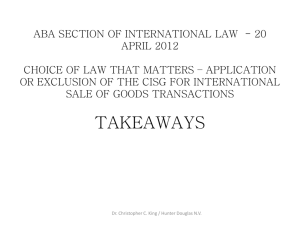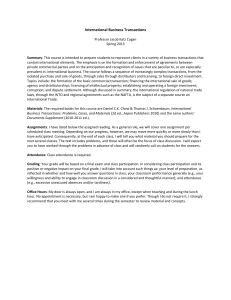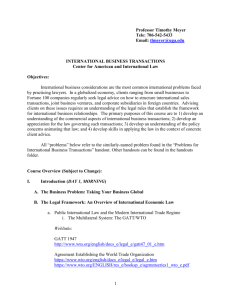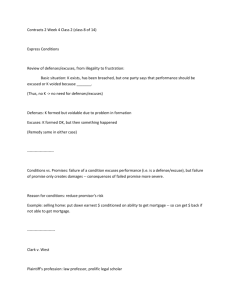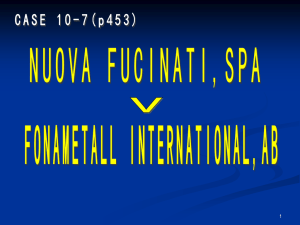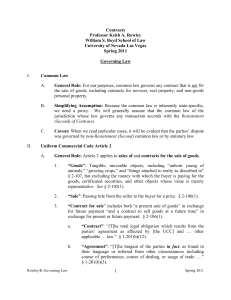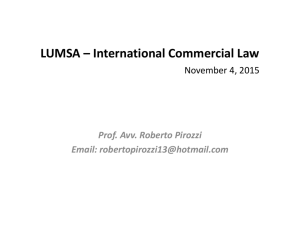Hot Topics in Sales - UNLV - William S. Boyd School of Law
advertisement
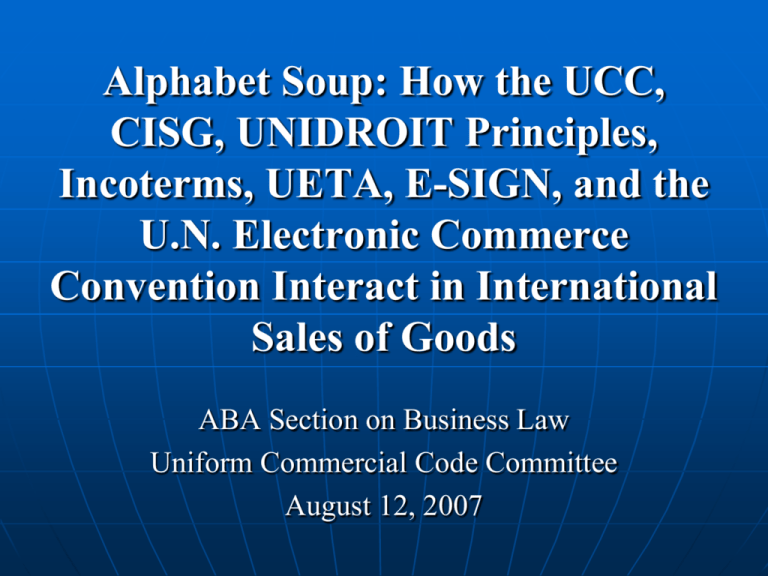
Alphabet Soup: How the UCC, CISG, UNIDROIT Principles, Incoterms, UETA, E-SIGN, and the U.N. Electronic Commerce Convention Interact in International Sales of Goods ABA Section on Business Law Uniform Commercial Code Committee August 12, 2007 The Law Governing International Sales of Goods Keith A. Rowley Professor of Law, William S. Boyd School of Law, University of Nevada Las Vegas and Charles E. Tweedy, Jr. Visiting Chairholder in Law, The University of Alabama School of Law krowley@law.ua.edu or keith.rowley@unlv.edu Scope of UCC Article 2 • § 2-102: Article 2 governs transactions (other than those intended solely for security) in goods. • § 2-106(1): Article 2 governs present or future sales (passing title from the seller to the buyer for a price) of goods. UCC § 2-105(1) “Goods” means all things (including specially manufactured goods) which are movable at the time of identification to the contract for sale other than the money in which the price is to be paid, investment securities (Article 8) and things in action. “Goods” also includes the unborn young of animals and growing crops and other identified things attached to realty as described in [§ 2-107]. “Mixed” Contracts Courts determine whether UCC Article 2 governs a transaction or dispute involving a contract for goods and either non-goods personal property or services using one of two tests: • Predominant purpose • Gravamen of the action CISG art. 1 (1) This Convention applies to contracts of sale of goods between parties whose places of business are in different States: (a) when the States are Contracting States …. (2) The fact that the parties have their places of business in different States is to be disregarded whenever this fact does not appear either from the contract or from any dealings between, or from information disclosed by, the parties at any time before or at the conclusion of the contract…. CISG art. 10 (a) if a party has more than one place of business, the place of business is that which has the closest relationship to the contract and its performance, having regard to the circumstances known to or contemplated by the parties at any time before or at the conclusion of the contract; (b) if a party does not have a place of business, reference is to be made to his habitual residence. CISG art. 2(a) This Convention does not apply to sales of goods bought for personal, family or household use, unless the seller, at any time before or at the conclusion of the contract, neither knew nor ought to have known that the goods were bought for any such use …. CISG art. 23 A contract is concluded at the moment when an acceptance of an offer becomes effective in accordance with the provisions of this Convention. CISG art. 18(2)-(3) An acceptance of an offer becomes effective at the moment the indication of assent (by return promise or performance) reaches the offeror…. within the time [the offeror] has fixed or, if no time is fixed, within a reasonable time …. CISG art. 2(b)-(f) The CISG does not apply to sales: • by auction; • by authority of law; • of stocks, shares, investment securities, negotiable instruments, or money; • of ships, vessels, hovercraft, or aircraft; • of electricity. CISG Art. 3(2) The CISG “does not apply to contracts in which the preponderant part of the obligations of the party who furnishes the goods consists in the supply of labor or other services.” CISG Art. 3(1) The CISG does apply to contracts “for the supply of goods to be manufactured or produced … unless the party who orders the goods undertakes to supply a substantial part of the materials necessary for such manufacture or production.” Contracting State Reservations A country that is a party to the CISG may declare that it is not bound by one or more provisions of the CISG -- most commonly: • the formation rules (Arts. 13-24); • Article (1)(1)(b); and • Articles 11 and 29 and those formation rules that recognize the validity of oral offers, acceptances, agreements, and modifications. Scope of the CISG: Recap Subject to a valid reservation, the CISG applies to sales of goods between parties whose places of business or habitual residences are in two Contracting States, unless (a) either party doesn’t know or have reason to know that the other party’s place of business is in another country; (b) the buyer is purchasing the goods for personal, family, or household use and the seller knows or has reason to know the buyer’s intended use of the goods or the sale is excluded by Article 2(b)-(f); or (c) the seller is primarily supplying labor or other services, to which the goods provided are incidental. Contracting Out of the CISG • • Article 6 permits the parties to “exclude the application of [the CISG] or, subject to article 12, derogate from or vary the effect of any of its provisions.” With one exception, U.S. courts have consistently required the parties to expressly disavow the CISG; simply choosing the domestic law of a jurisdiction will not suffice. CISG vs. UCC • American Mint LLC v. GOSoftware, Inc., 2006 WL 42090 (M.D. Pa. Jan. 6, 2006) • TeeVee Toons, Inc. v. Gerhard Schubert GmbH, 2006 WL 2463537 (S.D.N.Y. Aug. 23, 2006) • American Biophysics Corp. v. Dubois Marine Specialties, 411 F. Supp. 2d 61 (D.R.I. 2006) “Scope” of the UNIDROIT Principles The Principles shall be applied if the parties have expressly agreed the Principles will govern their contract and may be applied: • if the parties have agreed that general principles of law, including lex mercatoria, will govern their contract; • if the parties have not chosen governing law; • to interpret or supplement uniform law instruments, such as the CISG. UNIDROIT Principles art. 1.4 Nothing in the Principles shall restrict the application of mandatory rules, whether national [e.g., UCC], international [e.g., CISG] or supranational origin, which are applicable in accordance with the relevant rules of private international law. Incoterms 2000 • The CISG is silent on transportation terms (e.g., “F.O.B.”). The International Chamber of Commerce periodically publishes Incoterms, which define the commercial delivery terms most commonly used by parties to international sales contracts. • Several U.S. courts have treated Incoterms as a trade usage of which the parties to a contract otherwise governed by the CISG were or should have been aware when they made a contract including one or more terms defined by Incoterms. Harmonic Convergence • • CISG art. 9(b) (“The parties are considered, unless otherwise agreed, to have impliedly made applicable to their contract … a usage of which the parties knew or ought to have known and which in international trade is widely known to, and regularly observed by, parties to contracts of the type ….”) UNIDROIT Principles art. 1.9(2) (“The parties are bound by a usage that is widely known to and regularly observed in international trade by parties in the particular trade concerned ….”)

